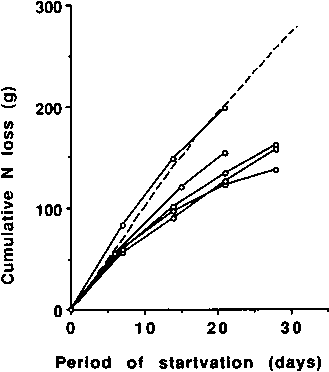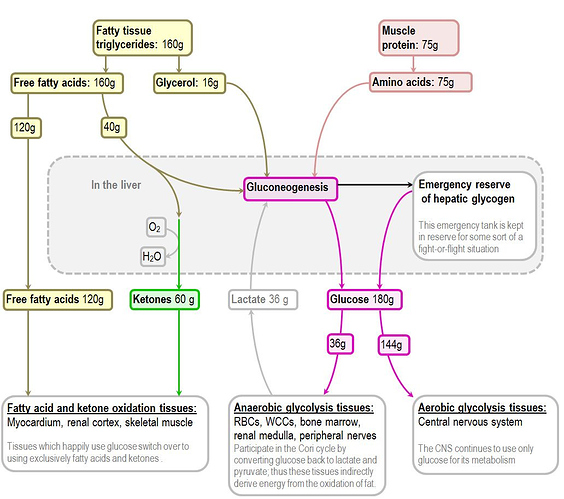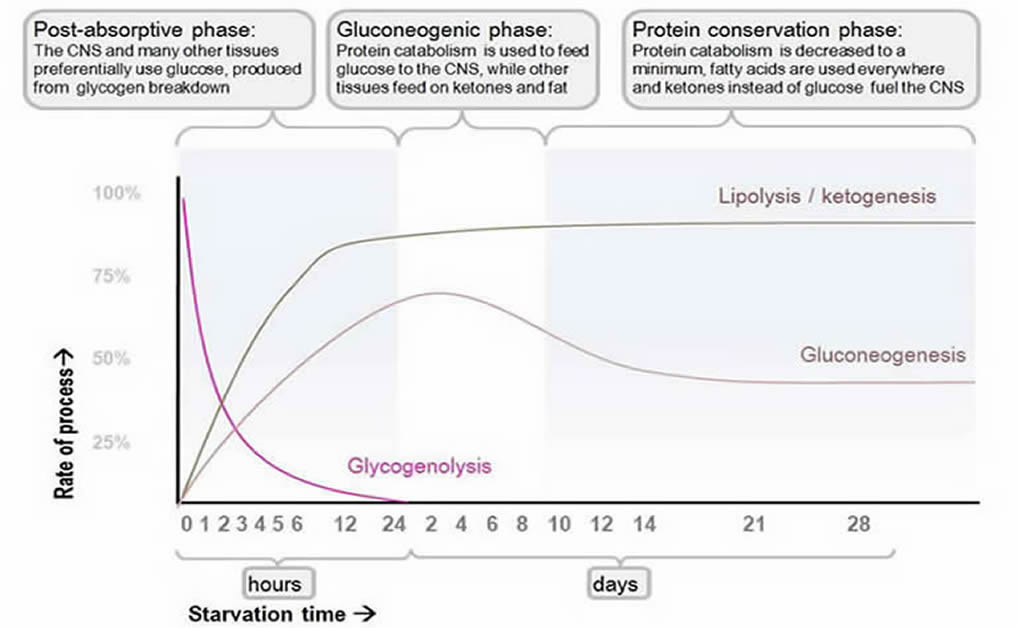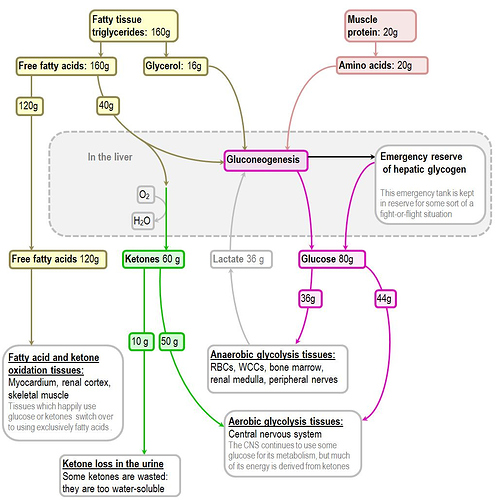Moreover, Dr Fung even claims that growth hormone rises substantially after the 3rd day or so of fasting.
Dr. Phinney's take on fasting
In this other thread about stalling, I think the protein that he’s talking about may often be coming from autophagy/autolysis where the body prioritizes the scavenging of damaged proteins, such as tumors, as well as out-dated parts of the immune system and getting rid of this stuff would be beneficial.
That doesn’t mean that everyone will experience beneficial protein catabolism and certainly not along the same fasting timelines, ie. how long or short a fast is, so I agree with Dr. Phinney in the broader sense that caution must be exercised to guard against loss of lean body mass (LBM) when fasting.
@Fiorella is a good example and I’m sure if she experienced any issues, her self-awareness would limit the length of her fasts. In my case, I seem to top out at about 36 to 48 hours for a fast because my body fat percentage is so low now; I have recently tried extended fat-fasting where I eat 1 small avocado in the morning and 1 in the evening and my Glucose Ketone Index (GKI) was great.
Having completed 102 total hours (36 hours and 66 hours respectively) of extended fasting this past week (not including other days of 18-24 hour IF), anecdotally I have not experienced any change in lean tissue. Only changes in visible vascularity and muscle definition while my weight has remained essentially the same. That being said, I also continued resistance training and cardiovascular activities while in this prolonged fasted state consuming only electrolytes.
I think Dr. Phinney is being overly cautious.
Pablo Klopp posted a brilliant primer on intermittent fasting with links to science that showed no loss in lean mass until after 36-40 hours of fasting. His personal blog is down, but here are the links to his posts on Mark’Daily Apple.
I found this very helpful when I started intermittent fasting back in 2010.
@Fiorella how low is your body fat %? I can’t go longer than 24 hours fasting because my BF is so low, and that is only when I have taken in a lot of energy (calories) the day before. I haven’t tried a fat fast, is it as effective as regular fasting on processes like autophagy? I usually IF everyday for at least 14 hours, I am wondering if this is beneficial at least to a certain degree, because I cannot engage in extended fasts due to my low body fat. My hormones are already compromised and dialing back on the amount of time spent fasting is one way to help my body think it’s not starving, even though I eat a great deal of food during the day. I get very frustrated at the lack of attention paid to the effects of fasting on lean individuals. So much is made of extended fasts in the keto community because I know many people are struggling with metabolic issues, weight loss, etc. But fasting does not work for everyone. I have listened to the new Fasting Talk podcast, and the female host, I think her name is Megan? She talks about fasting for 36 hours, and I know she is not obese, but I also don’t know if she is very lean, which would make it impossible for her to fast that long, and she would surely lose muscle tissue doing. So, the amount of lean tissue you lose during a fast will vary depending on your BF levels. I remember during one episode of Keto Talk, Doc Nally was talking about the issue of muscle loss during fasting and was referencing studies done in the 1970’s on a population of lean individuals and they lost a great deal of muscle while fasting, so the populations from several decades ago had a different metabolic make up than the populations of today that would benefit from fasting. There was less diabetes and obesity then, and clearly fasting will affect people with these health issues differently than people who are lean and disease free.
I edited it your post to cue the video up to Rod Taylors’s question on fasting.
Dr  has previously said that fasting consumes 0.75 lbs of muscle per day to keep the brain alive, but that would require a very specific and unlikely context.
has previously said that fasting consumes 0.75 lbs of muscle per day to keep the brain alive, but that would require a very specific and unlikely context.
I should start my mentioning that the liver makes glucose from all available substrates, which includes lactate coming back from fermenters like red blood cells, and glycerol as a result of lipolysis, and finally the pool of labile amino acids. That’s the stuff that is circulating (eg free amino acids, or lipoproteins such as albumin), sitting in structures pending catabolism (eg: the extracellular matrix of collagen that is always reconfigured as body fat is drawn down), and proteins undergoing turnover. The Labile pool is about 1% of our total lean body mass … it is normally refilled from dietary. Once that runs dry the body will keep the brain alive by using other sources starting with those least likely to impact immediate survival. Muscle and bone are on the list … but they’re not going to be first cab off the rank.
So let’s look at the fuel flow during fasting. This is a model of the energy flow of a human on day 1 of a fast from George Cahills starvation in man
After about 8 days of fasting the brain switched from running on glucose (from diet, then for 24 hours from glycogen, then for about 7 days from gluconeogenesis) to running mostly on ketones with a small residual requirement of glucose.
NB: for someone who is adapted to a ketogenic diet … we start our fast from the 8 day mark, because we are already in that state where our brains can run mostly on ketones.
The model after the brain adapts to running on ketones looks more like this;
Now bear in mind this is Cahills subject about which we know very little other than it is a middle aged man. But we can infer some things … for example he is able to produce energy from 160g/day of body fat so we can extrapolate that he has (160g x 9kCal/g = 1440 kCal / 31.5 kCal/day/lb Body Fat = ) 45.7 lbs of body fat…
What if we change the starting parameters, and give him 103 lbs of body fat, we can see he might be able to produce (103lbs * 31.5 kCal/lb ) 3244.5 kCal/day (assuming he could generate that demand) he would thus be burning 360.5g/day of body fat and liberating 36.05g/day of glycerol … thus completely replacing his bodies requirement of amino-acids to keep his glucose dependant tissue functioning.
This I believe is the context that provides a bridge between Dr. Phinney’s metabolic math, and Dr. Fungs clinical observation - Dr Fung is probably working with people who are significantly obese, and as Dr Phinney remarked in that video Obese people “seem somewhat protected from protein loss”. This is one way that that could happen.
Dr. Phinney shows a chart (below) of N loss during total fasts with FG Benedicts subject who was a lean Maltese man being the dashed line who lost 275g of nitrogen in 31 days - roughly 1.718 kgs of protein. BTW: I believe Dr Phinney has his math wrong when converting g N lost to lean tissue loss (he states 1g N = 1oz lean). The factor as I understand it is 6.25 ( https://goo.gl/RV6t6l ) so 1g of nitrogen loss should equate to 6.25 g of lean mass lost (or 0.22 oz).
Anyway the guys last meal prior to fasting was bananas and cream, strawberry shortcake, and ice cream. Pretty sure this guy walked into the chamber burning carbs and first had to keto-adapt. Also fascinating to read that study as the subject was a propagandist for fasting and they were so worried he would cheat the test that they spent a lot of effort making sure he didn’t drink his own urine to prevent nitrogen loss.
The various other studies (GOSCHKE et al., 1975; BALLENTYNE et al., 1973; BALL et al., 1967; and SWENDSEID et al., 1965) containing varyingly obese subjects who were also carb burners to begin with - you can see the curves flatten out as they adapted to fat burning.
Now consider that a lean carb burner went through 275g of nitrogen loss - which works out to be roughly 1.718 kg of protein. The more obese people lost more like 120-170g. But look at the obese people from their keto-adaptation point about 7 days in - one guy went from 60 to 140, so about 80g of Nitrogen lost in 25 days. That’s equates to only 0.5 kg of lean body mass in 25 days which if he had 50kgs of lean body mass that would be within his labile store (1% x 50kg = 500g). Being keto adapted will make a significant difference, as does having body fat to recruit for energy.

Finally Dr Phinney suggests that Autophagy is an ideological term and not a physiological term. The Japanese scientist who described it just won the nobel prize for Medicine.
Show me the formula
20 day fast, AKA WTF was I thinking?
Yep. This is a problem if you don’t have body fat, you are limited to the fat floating about your blood in lipoproteins and a little in lipid droplets in your cells - maybe 12-18 hours worth of energy.
Once you have tapped those you are limited by the rate you can draw energy from body fat. Around 31.5 kCal/day for every pound of body fat. So if you have 10lbs of body fat you have access to 315 kCalories. Ugh that second day is going to suck.
Anything that raises insulin will inhibit autophagy, so carbs and protein.
That is why I suggest working out what your theoretical limit of energy from body fat is, and supplementing it a little.
If you don’t have enough body fat to run your daily energy requirements, and you aren’t eating any calories, then your body will do 2 things;
- reduce your metabolic rate
- start burning the furniture (using protein for energy)
That’s the problem. People think if I have 10lbs of body fat that I must have 35,000 kCal to burn. But you can only access 315 kCal a day.
YES!! This is what frustrates me around all the fasting talk, the lack of acknowledgement regarding the relative duration of a fast to body fat levels. I literally have 10 pounds of body fat. I CANNOT fast for long without it disrupting my metabolic rate or causing other down stream effects . I also dislike that women’s specific hormonal needs are rarely discussed when considering the effects of fasting. I think over and above the limit of body fat to provide energy there needs to be a discussion about how fasting can potentially affect a woman’s reproductive hormones, especially if she is near her ideal body weight. I like Dr. Fung but he is always just making these blanket statements that it’s perfectly ok for women to fast, that it does not affect their bodies in a deleterious way. But, he does not account for the possibility that many women do not take in sufficient energy when they resume eating (women by far are more prone to undereating than men) and when you consider a woman who is lean and has hormonal imbalances, this further affects her response to fasting. What I am wondering is for those of us who can’t do extended fasts if the daily IF is helpful for those repair processes? Even if it’s only 14 to 18 hours?
Except at 1:13:04 he says specifically that you will lose this mass “even if you are keto adapted”.
I can’t toss out everything he says, but before listening to this I listened to 2 hours of Dr. Fung. Those 2 will have to argue it out, but from my perspective I will go with the guy who puts people on long fasts everyday and uses science from this century as well as all of the people on this site and others. There is no way everybody going on a fast is losing that much lean muscle every single time they fast.
I tried looking up the study he mentions and the only reference I can find is a 2007 study that tested the accuracy of the formula generated from that 1900’s study that determined that it did now work without considering the weight history of each person.
He didn’t say some people in some circumstances can lose up to this amount, he says everyone will, even keto adapted. That is a bold claim that goes against all the latest research I can find, and the fact that he says essentially why even do more research, this was settled decades ago makes me even more dubious.
Edit 2: Another from 2002 that shows the 1919 study is not the total answer, still looking for one to support his theory that this is a closed subject. published by Harris and Benedict in 1919, have been shown to overestimate basal energy
Edit too many: I found the calculation from the original on Wikipedia, according to it I should be eating over 3,000 calories per day. I would get fat FAST on 3k calories a day.
In Jimmy Moore’s recent Fasting Talk podcast he asked this question to Megan Ramos and she said that the autophagic benefits of more frequent, shorter fasts are cumulative, but I’m suspicious and don’t quite agree since I’ve heard estimates that although autophagy can start as early as 12 hours, that it doesn’t really start to get going until 24 hours which is about when HGH also starts to rise very significantly and can even take as much as 72 hours before really deep scavenging of damaged cells begins to take place.
This is why I’m also following people like Dr. Valter Longo who’s talking about his 5-day “Fasting Mimicking Diet (FMD)”, which is patented for protection against ineffective copycats, but reading the extract some enlightened reductionists have made certain assumptions that it is roughly like eating 2 small avocados (1 for breakfast and 1 for dinner) with some nutrient-dense “greens” supplement, although the actual FMD protocol is more complicated. The bottom-line is still in-line with @richard’s comments that those with low bodyfat will need to add dietary fat to meet their daily energy expenditure during longer fasts - I prefer @richard’s method because it is more precise.
My main point in bringing up Dr. Longo’s FMD as a “fat fast” is that his main goal is rebuilding the immune system through autophagy and scavenging junk through autolysis and if he thinks a fat fast is effective for cancer patients, then it would seem to be a way for those with low bodyfat to participate in extended fat fasting and still receive the benefits.
I think the only point of contention is how much fat is acceptable at any one time before it becomes ineffective, so I’m trying to stay under 200 calories during any 6-8 hour period.
This is my belief also. As you lose weight you naturally shrink. There is more unused skin, lean, and substrate. That’s what autophagy does. It comes down to this: Do I trust my body - evolution, intelligent design, God, whatever you name it - to recycle only the deadbeat cells and leave my healthy functioning cells in tact? My answer is yes, unless there is nothing left to scavenge. In that case your chest will look like Ted Naiman’s. 
Since there isn’t a clear answer among these two ‘experts’, I think one may be better off to consider one’s own situation rather than a blanket across the board response that applies to everyone. I’m an older female (69 yrs old), 5’2" 110lbs, approx. 85 lbs of lbm, active (weights, HIIT and lots of outdoor functional exercise), think ectomorph with endomorph tendencies, was pre-diabetic but have good BG numbers now. As soon as I read @richard’s article a while ago, it all made sense. I usually fast between 14-18hrs. I want the benefits of autophagy but it’s tricky. I think the greatest risk at my age is loss of lbm and I’ll do whatever I can to hold on to or even try to increase it. I’d welcome any further suggestions from you guys. 
At 110 I think fasting might not be a good idea for you, no? You may have to “fat fast” to make sure you get enough calories from fat and protect your lbm, as you say.
I suspect too that if you are healthy without any metabolic issues, and lean, there is probably less “scavenging” to be done so you may not require the same degree of repair that someone who is IR or T2D would need. There is probably less inflammation in general, so when your body is telling you that you can fast for shorter periods of time, it is a natural signal that your systems are adjusting for your own personal physiological needs. For folks with higher amounts of body fat, and metabolic issues, their bodies are going to tolerate the longer fasts because they have more inflammation and repair to do. It almost seems like being heavier with larger amounts of body fat is preferred in relation to discussions around fasting because it enables you to engage in the longer fasts, but those of us with less stored energy are essentially left out of the discussion, despite the fact that for people who reach their “goal weight” or body composition, they will need to adjust their approach to how much fasting they can tolerate.
I think in any setting with an audience of more than 1 and trying to translate to the layperson that you have to make some pretty broad generalizations and as we know better than most, everybody is way more different than we thought.
I am curious though about the nature of his comment, he said around 1:12:00 that this was a discussion for the scientific community but nobody seemed to be willing to have it with him.
I am to a point now where I have a little more fat to lose but not a lot, and I have been working on building muscle, fasting sounds like a great way to lose the fat but I don’t think it is worth the risk of muscle loss for me. As with all things diet, I should have done it a long time ago!
Agreed! Even now, I may have a breakfast of bacon, eggs and coffee (OMG, 3 meals lol) but I never snack or eat after 6pm. When I cut out night eating years ago, that made a world of difference to how I felt. I wasn’t testing BG then, so who knows what was happening there. Probably not good things. I think that being older than most folks here is another variable that impacts how I’d approach fasting.
@Emacfarland Oh, but I’m pre-diabetic, which is another variable. On the thin side but pre-diabetic. I was prescribed metformin a few years ago, which I still take (more for health longevity, as I get good BG numbers). I have no side effects.
I do like how he discussed “fat hunger” which is exactly what I would describe I feel after eating a dinner comprised of two pounds of fatty meat but am still feeling hungry after. I want MORE of the fat from the meat. If I go to bed feeling hungry still and I wake up in the middle of the night and my stomach is hurting because I’m so hungry all I want is to get up and cook up some crispy fat from a steak or pork!
This is why I try to eat before bed, something really fatty. I wake up feeling great too.
Though respect the crap out of Dr. Phinney, between the two only Dr. Fung is an expert on fasting. He deals with actual fasting patients daily. Dr. Phinney is making conservative guesses based on some limited studies. To your point, though, everyone should always consider their own situation regardless of how many ‘experts’ seem to agree.



